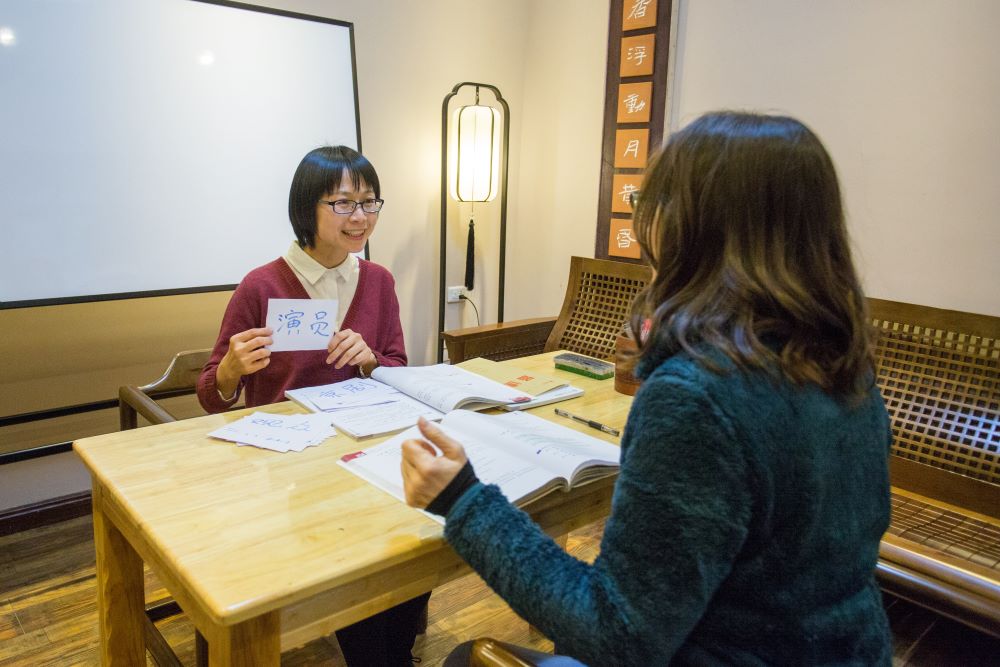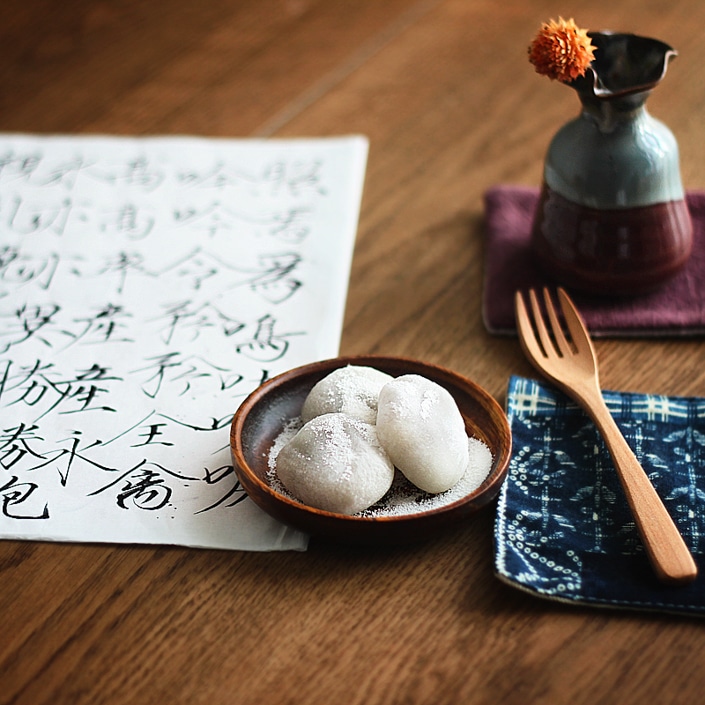How Do You Say “No” in Chinese?
Learn Chinese in China or on Zoom and gain fluency in Chinese!
Join CLI and learn Chinese with your personal team of Mandarin teachers online or in person at the CLI Center in Guilin, China.
If you’re new to Mandarin, chances are you want to learn some basic Chinese words and phrases. After “hello” and “my name is,” learning to say “no” in Chinese should be near the top of your list.
When it comes to reading this article, just don't say no (🔈 不要 bùyào)!
Table of Contents
- No Direct Translation
- 10 Ways to Say “No” in Chinese
- 1. 不是 | bùshì | no; is not; not be
- 2. 不要 | bùyào | no; don’t want
- 3. 不 | bù | no
- 4. 不对 | bùduì | incorrect; not correct
- 5. 不行 | bùxíng | not ok; not alright
- 6. 不可以 | bù kěyǐ | may not; cannot
- 7. 不可能 | bù kěnéng | not possible
- 8. 不用 | bùyòng | no use; no need
- 9. 没有 | méiyǒu | don't have; have not; no
- 10. 不好意思 | bùhǎoyìsi | my bad; sorry
- 11. “No” in other situations
- Just Say No!
- Essential Vocabulary for Saying No in Chinese
No Direct Translation
Saying “no” is an essential conversational skill. That’s especially true in China, where you’re likely to receive all sorts of offers (both well-meaning and not-so-well-meaning) to buy and do all sorts of things:
Want to teach English at the shady underground English training school down the street? (No.) Want to visit a nice Chinese teahouse on Nanjing Road? (No.) Want to buy this LV bag? I promise it’s authentic! (No.)
So how do you say “no” in Chinese? Unfortunately, there’s no direct Chinese translation for the simple English “no.” In general, the Chinese words or phrases needed to express negation vary depending on the situation.
Although this may sound intimidating, it is helpful to remember that the ways we say “no” in English are also somewhat dependent on context.
For example, we have various different words or phrases, like “no way,” “impossible,” and “not a chance,” each of which can be used in place of “no” when the situation calls for it.
Knowing more than just one or two ways to say “no” is a great way to help make your Chinese sound more authentic. Check out the following list of 10 ways to say “no” in Chinese for some ideas.

There's no direct translation for the English "no" in Chinese.
10 Ways to Say “No” in Chinese
1. 不是 | bùshì | no; is not; not be
One of the most common ways to say “yes” in Chinese is 是 (shì, to be). Therefore, it should come as no surprise that negating 是 (shì) by adding 不 (bù, not; no) is one way to say “no” in Chinese.
When you say 不是 (bùshì), you are literally saying “not be.”
Usually, 不是 (bùshì) is used when disagreeing with or disputing the truth of something someone else has said.
If someone asks you a question with the intention of confirming a fact, you can respond with 不是 (bùshì) to indicate that what they’ve said is not true.
For example:
| Speaker | 汉字 | Pinyin | English |
|---|---|---|---|
| A: | 你是美国人吗? | Nǐ shì Měiguórén ma? | Are you American? |
| B: | 不是。 | Bùshì. | No, I’m not. |
不是的 (bùshìde) is another phrase that can be used to say “no” in Chinese. It sounds a bit more informal than 不是 (bùshì), but the two are used in almost the same way and are more or less interchangeable.
For example:
| Speaker | 汉字 | Pinyin | English |
|---|---|---|---|
| A: | 这个礼物是给宝宝的吗? | Zhège lǐwù shì gěi bǎobǎo de ma? | Is this gift for the baby? |
| B: | 不是的。 | Bùshìde. | No, it isn’t. |
The characters 不 (bù) and 是 (shì) by themselves are both pronounced using a 4th (falling) tone. However, when the tone of the character that follows 不 (bù) is also a fourth tone, then 不 will experience a tone change which will cause it to temporarily adopt the second (rising) tone.
Therefore, even though the pinyin for 不是 is written bùshì, the phrase should actually be pronounced “búshì.”

Learning to say “no” in Chinese is an essential skill that makes everyday life in China much easier.
2. 不要 | bùyào | no; don’t want
不要 (bùyào) is a common way to refuse or reject something in Chinese. It is used to indicate that you don't want something or don't want to do something.
The phrase can be applied in various contexts to express refusal or negation in a direct yet polite manner.
| Speaker | 汉字 | Pinyin | English |
|---|---|---|---|
| A: | 你要吃鸡爪吗? | Nǐ yào chī jīzhuǎ ma? | Do you want to eat some chicken feet? |
| B: | 不要。 | Bùyào. | No, I don’t (want to). |
3. 不 | bù | no
If you search for the Chinese equivalent of the English word “no” in a popular Chinese dictionary like Pleco, chances are that the first entry you see will be 不 (bù).
Although native speakers will understand that you mean “no” if you respond to every question with a simple 不 (bù), doing so will not make you sound very authentic.
Using only 不 (bù) to respond may sounds quite abrupt and even angry.
For example, imagine that Person A in the following dialogue is a mother trying to make up with her teenage daughter (Person B), with whom she has just been fighting. The mother suggests they go for a walk together, but the daughter is still angry and responds abruptly:
| Speaker | 汉字 | Pinyin | English |
|---|---|---|---|
| A: | 要不要出去走一走? | Yào bù yào chūqù zǒu yī zǒu? | Would you like to go for a walk? |
| B: | 不! | Bù! | No! |
4. 不对 | bùduì | incorrect; not correct
In Chinese, 对 (duì) means “right” or “correct.”
Adding 不 (bù) in front of 对 (duì) allows you to say that something is “not right” or “incorrect.”
In general, you can use 不对 (bùduì) when you don’t agree with someone’s opinion or with a statement that they have made.
For example:
| Speaker | 汉字 | Pinyin | English |
|---|---|---|---|
| A: | 我觉得中国的古镇都很漂亮。 | Wǒ juédé Zhōngguó de gǔzhèn dōu hěn piàoliang. | I think all ancient Chinese cities are beautiful. |
| B: | 不对,现在有一些很商业化。 | Bùduì, yǒu yīxiē hěn shāngyèhuà. | No, some of them are really touristy. |
Note that since 对 (duì) is pronounced with a falling tone, the pronunciation of 不 (bù) changes to a rising tone when placed in front of 对 (duì). Thus, even though the official pinyin is still written as bùduì, you should pronounce it as “búduì.”

In China, everyday interactions provide a host of opportunities to practice the art of saying “no.”
5. 不行 | bùxíng | not ok; not alright
行 (xíng) means “OK” or “all right” in Chinese. As with 不是 (bùshì) and 不对 (bùduì) above, adding 不 (bù) in front of 行 (xíng) turns it into a negative.
不行 (bùxíng) can be roughly translated as “not OK” or “not all right.”
For example:
| Speaker | 汉字 | Pinyin | English |
|---|---|---|---|
| A: | 你的车子借我一下? | Nǐ de chēzi jiè wǒ yīxià? | Can you lend me your car? |
| B: | 不行。 | Bùxíng. | No. |
Unlike 对 (duì) and 不 (bù), which are pronounced with falling tones, 行 (xíng) is pronounced with a rising tone. Therefore, the pronunciation of 不 (bù) does not change when the two are paired together.
6. 不可以 | bù kěyǐ | may not; cannot
不可以 (bù kěyǐ) is another phrase that can be used to say “no” in Chinese. It consists of 可以 (kěyǐ), which can be translated as “can” or “may,” and the negative character 不 (bù).
Taken together, the phrase 不可以 (bù kěyǐ) can be literally translated as “not can” or “not may.”
It is used in essentially the same way as the English “may not” or “can’t” when responding negatively to a request or question.
For example:
| Speaker | 汉字 | Pinyin | English |
|---|---|---|---|
| A: | 这里可以拍照吗? | Zhèlǐ kěyǐ pāizhào ma? | Can I take photos here? |
| B: | 不可以。 | Bù kěyǐ. | No, you can’t. |

不可以 is a good way to express the fact that something isn’t allowed.
7. 不可能 | bù kěnéng | not possible
Want a stronger negative answer? Look no further than 不可能 (bù kěnéng).
This phrase consists of the negative character 不 (bù), followed by 可能 (kěnéng), which in Chinese means “maybe” or “possibly.”
Add them together, and you get 不可能 (bù kěnéng), which means “not possible,” “impossible” or “no way.”
Use 不可能 (bù kěnéng) when you want to let someone know that whatever they have said is completely out of the question or completely impossible.
For example:
| Speaker | 汉字 | Pinyin | English |
|---|---|---|---|
| A: | 听说你要结婚了。 | Tīng shuō nǐ yào jiéhūn le. | I heard you’re going to get married. |
| B: | 不可能,我都没有男朋友。 | Bù kěnéng, wǒ dōu méiyǒu nánpéngyǒu. | No, that’s impossible, I don’t even have a boyfriend. |
Note that the meaning of 不可能 (bù kěnéng) can change depending on the context in which it is used. When used to respond negatively to a request, 不可能 (bù kěnéng) sounds quite harsh and severe.
Responding to a request with 不可能 (bù kěnéng) indicates that you are not only refusing the request, but are also unhappy that the request was made and consider the request inappropriate.
For example:
| Speaker | 汉字 | Pinyin | English |
|---|---|---|---|
| A: | 你可以把信用卡借给我吗? | Nǐ kěyǐ bǎ xìnyòngkǎ jiè gěi wǒ ma? | Can you lend me your credit card? |
| B: | 不可能。 | Bù kěnéng. | No way. |
8. 不用 | bùyòng | no use; no need
If you are looking for a polite way to say “no” to someone’s offer, 不用 (bùyòng) is the phrase for you. Although 不用 (bùyòng) also contains 不 (bù), its meaning is hard to guess using its component parts.
用 (yòng) in Chinese means “to use,” so 不用 (bùyòng) could be translated literally as “not use” or “no use.” However, this literal translation doesn’t shed much light on its actual meaning, which is “no thanks.”
In general, 不用 (bùyòng) is used to indicate polite refusal.
For example:
| Speaker | 汉字 | Pinyin | English |
|---|---|---|---|
| A: | 你需要帮忙吗? | Nǐ xūyào bāngmáng ma? | Do you need help? |
| B: | 不用。 | Bùyòng. | No, thanks. |
In most cases where 不用 (bùyòng) is used, it can also be repeated, as in 不用,不用 (bùyòng, bùyòng). Repeating the phrase twice makes your response sound milder and more indirect than it would if you only used a single 不用 (bùyòng).
For example:
| Speaker | 汉字 | Pinyin | English |
|---|---|---|---|
| A: | 我送你回去吧。 | Wǒ sòng nǐ huíqù ba. | Let me take you home. |
| B: | 不用,不用。 | Bùyòng, bùyòng. | No, thanks. |
Note that since 用 (yòng) is pronounced with a falling tone, the phrase 不用 (bùyòng) is actually pronounced “búyòng.”

不用 is a good way to refuse someone’s offer of help with finesse.
9. 没有 | méiyǒu | don't have; have not; no
Unlike all of the other ways to say “no” in Chinese that we’ve discussed so far, 没有 (méiyǒu) does not contain the character 不 (bù).
Don’t let this fact fool you, though. 没有 (méiyǒu) is actually one of the most commonly used ways to say “no” in Mandarin.
If we break 没有 (méiyǒu) into its component parts, we get 没 (méi), which means “not” and (yǒu), which is a verb meaning “to have.” Thus, the literal translation of 没有 (méiyǒu) is “not have.”
Unsurprisingly, one of the ways 没有 (méiyǒu) is used is to tell someone that you don’t have something.
For example:
| Speaker | 汉字 | Pinyin | English |
|---|---|---|---|
| A: | 你有笔记本电脑吗? | Nǐ yǒu bǐjìběn diànnǎo ma? | Do you have a laptop? |
| B: | 没有。 | Méiyǒu. | No (I don’t). |
In addition to being used to talk about what you don’t have, you can also use 没有 (méiyǒu) to talk about things that haven’t happened yet or that you haven’t done yet.
For example:
| Speaker | 汉字 | Pinyin | English |
|---|---|---|---|
| A: | 你吃过臭豆腐吗? | Nǐ chīguò chòudòufu ma? | Have you ever eaten stinky tofu? |
| B: | 没有。 | Méiyǒu. | No (I haven't). |

没有 is a commonly used way to say “no, I haven’t” in Chinese.
10. 不好意思 | bùhǎoyìsi | my bad; sorry
If you want to refuse someone’s request in a polite way, consider using 不好意思 (bùhǎoyìsi) or 抱歉 (bàoqiàn). Both of these phrases mean “sorry.”
To use these phrases correctly, be sure to pair them with the reason why you can’t do whatever was requested.
For example:
| Speaker | 汉字 | Pinyin | English |
|---|---|---|---|
| A: | 今天要去逛街吗? | Jīntiān yào qù guàngjiē ma? | Want to go window-shopping today? |
| B: | 不好意思,我今天没时间。 | Bùhǎoyìsi, wǒ jīntiān méi shíjiān. | No, sorry, I don’t have time today. |
抱歉 (bàoqiàn) sounds somewhat more direct and formal than 不好意思 (bùhǎoyìsi) and is more likely to be used in more formal contexts like at work.
For example:
| Speaker | 汉字 | Pinyin | English |
|---|---|---|---|
| A: | 我们明天可以约个时间讨论吗? | Wǒmen míngtiān kěyǐ yuē gè shíjiān tǎolùn ma? | Can we set up a time to discuss this tomorrow? |
| B: | 抱歉,我明天不在办公室。 | Bàoqiàn, wǒ míngtiān bùzài bàngōngshì. | No, I’m sorry, I won’t be at the office tomorrow. |
11. “No” in other situations
Perhaps the most common way to say “no” in Chinese is to simply use 不 (bù) to negate the most important verb or adjective in the question that you’ve been asked.
Note that using this method usually requires you to have some existing basic Chinese vocabulary so that you can identify the key words in the question and respond appropriately.
Check out the examples below to see how this method works with some common Chinese verbs and adjectives that you’re likely to encounter:
Example 1:
| Speaker | 汉字 | Pinyin | English |
|---|---|---|---|
| A: | 你会用筷子吗? | Nǐ huì yòng kuàizi ma? | Can you use chopsticks? |
| B: | 不会。 | Bù huì. | No, I can’t. |
Example 2:
| Speaker | 汉字 | Pinyin | English |
|---|---|---|---|
| A: | 你喜欢这件衣服吗? | Nǐ xǐhuān zhè jiàn yīfú ma? | Do you like this piece of clothing? |
| B: | 不喜欢。 | Bù xǐhuān. | No, I don’t (like it). |
Just Say No!
Learning to say “no” is an important skill that every beginning Chinese student needs to master.
Since refusing someone’s suggestion or request can easily cause offense, it’s especially important that you master the nuanced differences between each of the different ways to say “no” in Chinese that we’ve presented here. Doing so will help you avoid unintentionally hurting anyone’s feelings.
One of the best ways to really get a feel for which words work best in which contexts is full immersion in a Chinese speaking environment.
However, if it isn’t possible for you to travel to China now, consider creating your own online language immersion environment by watching TV shows in Chinese. Finding native Chinese speakers to communicate with online is also a great way to hone your understanding of how language use varies according to context.
If you’ve had enough when it comes to learning how to refuse requests, why not check out our article on how to say “yes” in Chinese?
好好学习,天天向上!

Mastering the different ways to say “no” in Chinese is a great way to make your Chinese sound authentic.
Essential Vocabulary for Saying No in Chinese
| Hànzì | Pīnyīn | Definition |
|---|---|---|
| 不是 | bùshì (pronounced "búshì") | no/incorrect |
| 不是的 | bùshìde (pronounced "búshìde") | no/incorrect |
| 不 | bù | no (abrupt, can be impolite) |
| 不对 | bùduì (pronounced "búduì") | no/incorrect |
| 不行 | bùxíng | no (can be impolite) |
| 不可以 | bù kěyǐ | no, [you] can't/may not |
| 不可能 | bù kěnéng | impossible/no way (can be impolite) |
| 不用 | bùyòng (pronounced "búyòng") | no, thanks (polite) |
| 没有 | méiyǒu | no |
| 不好意思 | bù hǎoyìsi + explanation | sorry (polite) |
| 抱歉 | bàoqiàn + explanation | sorry (polite) |
| 不会 | bùhuì (pronounced "búhuì") | No, [I] can't |
| 不要 | bù yào (pronounced "búyào") | No, [I] don't want to/don't want it |
| 不喜欢 | bù xǐhuān | No, [I] don't like it |

Anne Meredith holds an MA in International Politics and Chinese Studies from the Johns Hopkins School of Advanced International Studies (SAIS). As part of the graduation requirements for the program, Anne wrote and defended a 70-page Master's thesis entirely in 汉字 (hànzì; Chinese characters). Anne lives in Shanghai, China and is fluent in Chinese.















